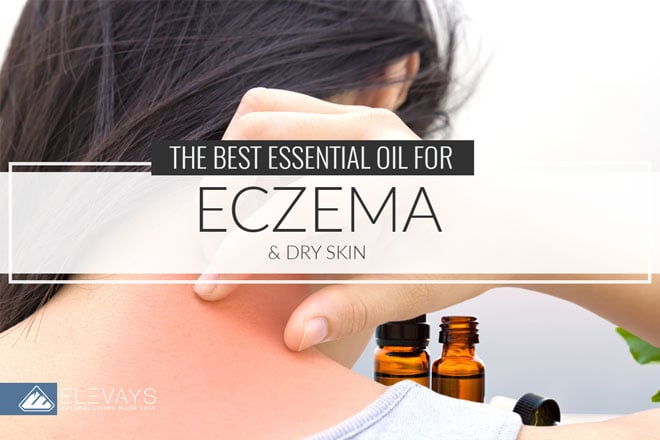The rash, the dryness, the flaking skin, the bumps, the peeling, the redness, the itching – these are all uncomfortable, painful, and exceedingly frustrating symptoms of the very common skin condition eczema.
And if that severe itching and sensitive raw skin weren’t bad enough, you also have to deal with the embarrassment of having red patches, cracks, scales, and swelling on your body. On top of it all, you’re probably also exhausted from the itch and burn keeping you awake at night.
With over 3 million cases of eczema a year, and many of them in children, you or your child(ren) are not alone in suffering, but you are undoubtedly fed up, and conventional treatments may not feel like the best skin saviors (and they’re not – we’ll learn why in a minute!).
There’s hope for you to feel better: while eczema may not have a cure, there are many safe and all-natural solutions that provide real symptom relief and help heal your skin. One of these are essential oils.
I’m here to share with you the best essential oil for eczema – including essential oils for baby eczema – as well as multiple carrier oil options that will help to heal and add proper moisture. Let’s see just how the power of essential oils can calm the itch and heal your skin.
Why You Have Eczema
At the end of the day, nobody is entirely sure why you have eczema. There’s no singular definitive cause. The good news is, however, medical professionals actually know quite a bit about this skin condition – and this information can give you some clues as to why you’re left itching!
The National Eczema Association says the eczema equation is most likely:
Your genes + a trigger = eczema
So first – your genes. In an eczema-free body, the skin protects you from anything harmful like bacteria or allergens. It should also keep in the proper amount of moisture. There’s a genetic component in those with eczema that leaves your skin unable to accomplish these essential tasks fully, and it runs in families. While genetics does play a role, don’t hang your hat on that. There are certain lifestyle factors that actually can trigger the expression of those “eczema” genes as we’ll review below.
Immune System Issues: Anyone with an immune system dysfunction or super high inflammation may end up with eczema. In fact, people with overly reactive immune systems tend to have eczema much more than others. Your immune system could be in a “hyper-active” state from exposures to environmental toxins (like conventional laundry detergent and personal care products that aggravate the skin) or things that you’re eating (see below).
Gut Health: There’s also a very strong correlation between skin issues and your gut. Remember, your gut is home to a large majority of your immune system. When your gut is unhealthy or “leaky,” so is the rest of your body – including your skin. Interestingly enough, maternal gut health may lead to a reduced risk of eczema in children, so take your probiotics while you’re pregnant and nursing. Many people also experience eczema because of inflammation in the gut caused by dairy, gluten, soy or other processed foods and preservatives.
Dry Skin: If your skin is super dry, your chances of flaring up are much higher. So, if you live in a drier climate this applies to you. Fortunately, I have some great information below on how to combine natural moisturizers with the best essential oil for eczema, so this should no longer be a problem for you.
Food Allergies: Though the eczema is not an allergic reaction itself, having an allergic reaction in other ways can trigger an eczema flare-up. This ties back to gut health as we previously mentioned. Food allergies are a big one. This is especially true in children, and relates back to gut health too. If your kids are dealing with eczema, try cutting out dairy and gluten first. Often times this will drastically improve the issue or heal it entirely.
Products: Harsh and chemical-laden toiletry, beauty, or cleaning products can often bring on an eczema flare-up or exacerbate one that’s already in progress (yet another reason to learn more about the best essential oil for eczema!). Anything labeled “antibacterial” is probably a problem. Products like this deplete good bacteria on the skin which is important for your microbiome and healthy immune system function.
Stress: Emotional stress can lead to a flare-up, which becomes an unfortunate cycle. You’re stressed, so your eczema gets worse. Then you stress more about the aggravated eczema, and it continues to get worse. Stress relief techniques are essential to end the cycle.
Water: Too much water exposure – like a long pool day or a lingering bath – may make your eczema worse. Don’t stay in the shower too long.
Cigarettes: Smoke can be enough of an irritant to worsen eczema. If you or your child is suffering, you must quit smoking immediately.
Why Go Natural for Eczema
Even when you greatly limit possible eczema triggers, you still may not find full relief since there is no real cure for eczema. This means nobody – doctors and wellness practitioners included – has the miracle treatment to completely rid you of your itch, pain, and swelling forever.
So beyond making those lifestyle changes that can reduce and even prevent flare-ups (like boosting gut health, always moisturizing after your bath, or limiting your stress), the only other solution you have left is using something to treat the symptoms and soothe the skin.
There are many “conventional” eczema home treatment products available to you, but many of them are anything but healthy… and as we will see, some aren’t helpful.
Here’s a rundown:
- While calamine itself is not harmful for you, many companies add extra ingredients like parabens or phthalates in their lotion mixtures that could cause endocrine disruption and even cancer.
- Over-the-counter Benadryl is often used to calm the itching, but it is unsustainable for daily use as it makes you tired enough that it is not safe to drive a car or operate any sort of machinery.Not to mention, taking a medication daily for eczema is just not ideal or practical.
- Non-prescription steroid creams like hydrocortisone can be risky and they don’t really work. First, they are just a band-aid for eczema symptoms and once you stop using it the eczema is usually worse than it was before. It can also damage skin cells leading to thinning skin that bruises more easily. The body can also get so adapted to the steroids that you just need more and more to get the same effect that you did before. Plus, hydrocortisone has been connected with suppressing adrenal glands as well as your body’s natural steroids.
- You may think something rich like a Vaseline or mineral oil based ointment would give your dry skin the refreshment it needs, but these choices actually make eczema worse. They sit on top of the skin and essentially suffocate it – it won’t be able to breathe.
- Then there’s the corticosteroids your doctor may prescribe. While they may help your symptoms, both long-term and short-term negative side effects from corticosteroids have been well documented in health journals.
When we turn to all-natural solutions instead, like the best essential oil for eczema, we are using ingredients that actually help the problem without harming us in any other way.
Best Essential Oil for Eczema
Now we get to the good stuff: 8 essential oils that will help you with your eczema. While the ideal solution is to combine a few of these, I’m going to break each one down and share their unique benefits. This way you can discover which you’d like to try.
Lavender
Lavender oil is the ultimate soother – it soothes our mental health just as much as it soothes our physical health, which is why it is the best essential oil for eczema.
Not only is it going to calm the irritation, redness, and itching, but it will also calm the anxiety that comes from dealing with eczema flare-ups – a great way to end that vicious cycle of stress and eczema.
If the pain and itching keep you awake at night, the lavender can help you sleep too. That’s why I recommend making lavender your go-to nighttime eczema treatment.
Melaleuca (or Tea Tree Oil)
Now we get to the best essential oil for eczema for anybody who’s a big scratcher.
First off, melaleuca’s properties can calm the itchiness and the irritation that cause you to scratch. But what if you’ve already scratched too much? When your skin is raw and maybe even open from scratching an eczema patch, it’s susceptible to infection. Melaleuca is also a fabulous antiseptic to keep you safe.
Frankincense
Where many of these other oils are fabulous at treating symptoms, frankincense is the best essential oil for eczema when it comes to actual healing. Frankincense helps regenerate cells – including skin cells – so they can heal and repair.
It’s also a lovely oil for calming overall inflammation and even providing some mild pain relief to the area. It also has a calm, relaxing aroma and blends well with lavender.
Roman Chamomile
Since it reduces redness and calms the skin, Roman chamomile is a fantastic essential oil for anyone suffering from eczema. But it just so happens to be one of the top essential oils for baby eczema in particular. Chamomile is one of the safer essential oils for the young, tender skin of babies and children.
One 2013 study even found that chamomile extract was superior to hydrocortisone in treating the symptoms of eczema.
As an added bonus, it’s emotionally soothing (just like a mug of hot chamomile tea soothes you), so the aroma can help calm your upset child who is tired of itchy, uncomfortable skin. Remember: their stress is going to make their eczema worse too.
Thyme
Thyme is another highly antiseptic oil. It can fight both fungus and bacteria to keep your raw skin free from infection. In fact, a 2015 study concluded making a 3% thyme essential oil blend could treat mild to moderate “eczema-like lesions.”
Thyme is also great at reducing redness, improving swelling, and fighting against the pain of eczema.
Geranium
Geranium is a popular oil for any sort of skin condition, as it is incredibly calming and soothing. But the benefits don’t stop there.
A study on geranium oil found that it has “significant potential” in the development of new inflammatory medications that are safer for people to use – which basically means it will beat the inflammation without harming your health.
Helichrysum
This is the best essential oil for eczema scars. Sometimes even after an irritated patch of eczema fades away, you’re still left with some discoloration and scarring (this is especially true if you are a scratcher!). Helichrysum can help that area heal and fade.
But it also works wonders while the eczema is still active – it can even reduce itchiness and overall irritation.
Sandalwood
Sandalwood is the best essential oil eczema when it comes to calming the itch – it does that through its anti-inflammatory properties as well as its ability to provide some major stress relief for the mind.
I also love that sandalwood is a “thicker” essential oil with nourishing properties that soothe skin to lock in moisture. Everything that you need to calm dry, itchy skin from an eczema flare up.
Additionally, one of the properties in sandalwood is something called sanatol, which acts very similarly to NSAIDs. Researchers said sandalwood oil can actually “mimic” pain relievers like ibuprofen – without any of the harmful side effects.
Carrier Oils for Eczema Essential Oils
In the end, the best essential oil for eczema is actually a blend of some of these oils. When you join them together, you can combine their strengths into one powerful eczema healer. But you can’t just blend them and add them directly to your skin.
Your best essential oil for eczema blend needs to be incorporated into a carrier oil.
When your skin is already so sensitive from the eczema, you don’t want to add strong essential oils to the irritated area directly. The right carrier oil will help dilute the oil and help it to cover a more broad surface area. Also, the carrier oil will add its own extra nourishment to your eczema patch. Remember – dry skin is one of the main eczema triggers.
I have three favorite carrier oil options to help you use your best essential oil for eczema:
- Almond Oil: This is my #1 pick for an eczema carrier oil. Almond oil is rich in vitamin E, which the skin absolutely loves – ancient medicinal traditions often use sweet almond oil as an eczema treatment even on its own.
- Avocado Oil: This oil is highly nourishing and moisturizing without suffocating the skin; it also has plenty of helpful fatty acids and vitamins too.
- Coconut Oil: This is one of the best all-natural moisturizers for anyone. Be sure to choose an organic and unrefined/cold-pressed coconut oil. If you are prone to breakouts, don’t choose this oil on your face. Though it’s one of the best around, it’s also highly comedogenic (AKA: it can clog pores)
Now all you have to do is choose what combo of the essential oils you want to go into your best essential oil for eczema blend and add it to one of these carrier oils.
Though rollerball blends are great for a lot of situations, they’re not great for eczema. If your eczema is ever raw or open, you don’t want to keep putting the same rollerball on the inflamed skin. This could potentially breed infection.
Keep your best essential oil for eczema blend in a small mason jar or other glass container. Then pour a small amount onto your (washed!) fingers to gently add the concoction directly to the skin.
Moisturizing tip: If you want to turn this blend into more of a cream than an oil, simply add some melted raw shea butter to the mix of essential oils and carrier oil. This soothing moisturizer is well known for its eczema healing properties as well.
Essential Oils for Baby Eczema 101
First off, most eczema sufferers are young children. As they age, the flare-ups often get less severe and less frequent. As mentioned previously, take a look at the child’s diet. Remove dairy and gluten first since these are commonly associated with eczema.
Since little ones deal with eczema more often than adults, you may want to soothe their pain with essential oils for baby eczema. Some oils are entirely safe and helpful for babies and their fresh skin, but you have to do it correctly.
If you are looking to make a blend of essential oils for baby eczema, stick to these guidelines:
- Introduce one essential oil at a time.
- Dilute them always. A good ratio is 1 or 2 drops to one ounce of carrier oil.
- Try starting with lavender or Roman chamomile at the beginning. These are both extremely gentle.
- Do a small patch test on their arm or leg in an area that does not have eczema patches to make sure their brand-new skin can handle that particular essential oil and carrier oil.
- Start slowly incorporating other options one at a time with high dilution.
Some essential oil experts recommend waiting until your newborn has reached the 3-month stage before introducing essential oils. Personally, we’ve always used the mild essential oils (like Lavender and Roman Chamomile) when our children were very young. But it all depends on your comfort level. As long as the oils were properly diluted I was always good with it.
Calming Eczema Naturally
If you or your child suffer from eczema, take heart. There are so many different essential oils that can provide real relief to the most frustrating symptoms. What’s even better is they can provide healing to keep the flare-ups away – and they do it all without dumping a bunch of chemicals and side effects into the body.
I’d love to hear more from those of you with eczema or those whose children have eczema. What treatments have you tried? What works well and what doesn’t? Have you given any essential oils a try? If so, what’s the best essential oil for eczema you’ve loved? Share your thoughts in a comment below!
Other ways to support healthy skin:
Our Beauty Collagen Complex is amazing way to support healthy skin. It’s formulated with clinically-proven collagen, collagen booster for effectiveness, and potent skin-loving herbs, vitamins, and minerals. It’s a yummy vanilla-honey flavor making it amazing for the whole family. I love to add it to my morning latte and add a scoop to my kid’s smoothie or oat pancakes. To learn more and shop, go here!
Sources:
- WebMD. Eczema Causes. Retrieved from: https://www.webmd.com/skin-problems-and-treatments/eczema/eczema-causes#1
- Mama Natural. Which is the best carrier oil for essential oils? Retrieved from: https://www.mamanatural.com/best-carrier-oil/
- The Hippy Homemaker (2014). Safe Essential Oil Use with Babies & Children. Retrieved from: http://www.thehippyhomemaker.com/essential-oil-safety-babies-children/
- EWG. Calamine. Retrieved from: https://www.ewg.org/skindeep/ingredient/700949/CALAMINE/#.WoSkZ2bMwdU
- Skin Remedies. Why Use Hydrocortisone Cream with All Its Side Effects? Retrieved from: http://www.skin-remedies.com/hydrocortisone-cream.html
- Mueller, Paul S. (2017). The Downsides of Short-Term Corticosteroids. NEJM. Retrieved from: https://www.jwatch.org/na43927/2017/05/02/downsides-short-term-corticosteroids
- National Eczema Association. Eczema Treatment. Retrieved from: https://nationaleczema.org/eczema/treatment/
- BeuatyMunsta. 15 Essential Oils for Eczema Treatment and Recipes. Retrieved from: https://beautymunsta.com/15-essential-oils-for-eczema-treatment-recipes/
- Cade, Brooke. (2017) The Best Essential Oils for Eczema & Dry Skin. It’s an Itchy Little World. Retrieved from: https://itchylittleworld.com/the-best-essential-oils-for-eczema/
- Shimelis ND, Asticcioli S, Baraldo M, Tirillini B, Lulekal E, Murgia. (2012). Researching accessible and affordable treatment for common dermatological problems in developing countries. An Ethiopian experience. PubMed. Retrieved from:https://www.ncbi.nlm.nih.gov/pubmed/22715822
- Renata Dawid-Paćcorr. (2013) Medicinal plants used in treatment of inflammatory skin diseases. PMC. Retrieved from: https://www.ncbi.nlm.nih.gov/pmc/articles/PMC3834722/#CIT0015
- All Natural Ideas. (2017) What are the best essential oils for eczema? Retrieved from: https://allnaturalideas.com/best-essential-oils-for-eczema/
- Mohamed Nadjib Boukhatem, Abdelkrim Kameli,Mohamed Amine Ferhat, Fairouz Saidi,2 and Maamar Mekarnia. (2013). Rose geranium essential oil as a source of new and safe anti-inflammatory drugs. PMC. Retrieved from: https://www.ncbi.nlm.nih.gov/pmc/articles/PMC3793238/
- Sheehan, Lindsay, (2015). 12 Anti-inflammatory essential oils to heal eczema. Natural Living Ideas. Retrieved from: http://www.naturallivingideas.com/heal-eczema-with-essential-oils/
- Sharma M1, Levenson C, Bell RH, Anderson SA, Hudson JB, Collins CC, Cox ME. (2014). Suppression of lipopolysaccharide-stimulated cytokine/chemokine production in skin cells by sandalwood oils and purified α-santalol and β-santalol. PubMed. Retrieved from: https://www.ncbi.nlm.nih.gov/pubmed/24318647









Thank you for the great ideas. I can’t wait to try the Roman Chamomile oil with coconut oil on my exzema!
Awesome blog…thanks for sharing with us
Great article that is…..keep it up
Thanks for sharing this amazing article with us